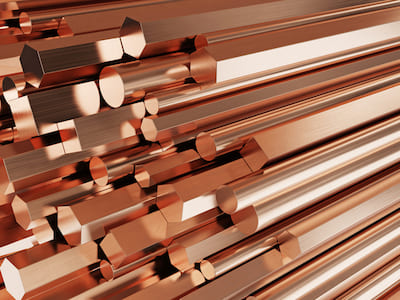Leading Trends in Home Design Featuring Stylish and Useful Copper Products
Leading Trends in Home Design Featuring Stylish and Useful Copper Products
Blog Article
Exploring the Diverse Applications of Copper Products in Modern Industries
Copper items have actually developed themselves as indispensable components throughout a myriad of modern sectors, primarily as a result of their impressive conductivity, pliability, and resistance to corrosion. From improving the effectiveness of electric systems to playing an essential role in sustainable power modern technologies, the versatility of copper is noticeable. Additionally, its recyclability settings it as a sustainable choice in production and electronics. As industries progressively focus on technology and sustainability, the varied applications of copper warrant a closer assessment, specifically regarding their potential influence on future technological developments and environmental methods.
Electric Applications of Copper
Copper is a necessary material in the electric market, accounting for about 60% of the total demand for non-ferrous metals internationally - Copper Products. Its premium electric conductivity, which is almost twice that of aluminum, makes it the recommended choice for a vast array of electrical applications. From circuitry systems in domestic and business buildings to high-voltage power transmission lines, copper guarantees efficiency and integrity in electrical power delivery
In addition to circuitry, copper is indispensable to the manufacturing of electric components such as generators, transformers, and motors. These elements utilize copper's thermal conductivity and malleability, essential for warmth dissipation and reliable performance. Additionally, copper's resistance to rust improves the life expectancy and durability of electrical systems, making it an economical service in the long-term.
The development of renewable resource sources, such as solar and wind power, has better raised the need for copper in electrical applications. As industries change towards lasting energy options, copper's role comes to be even a lot more essential. Overall, the versatility and efficiency features of copper strengthen its standing as a foundation material within the electric market, driving technology and performance across numerous applications.
Plumbing and Piping Solutions
In modern-day plumbing systems, the choice of products considerably impacts both functionality and long life. Copper has actually become a favored choice as a result of its unique properties, consisting of corrosion resistance and antimicrobial attributes. These features ensure that copper piping stays durable and safe for transporting safe and clean water, a crucial factor to consider in property and business applications.
One of the crucial advantages of copper in plumbing is its capability to stand up to high temperatures and stress, making it appropriate for a selection of applications, from hot water systems to heating and cooling networks. Additionally, copper's flexibility permits less complicated installment in intricate piping layouts, minimizing the risk of leaks and failures.
One more noteworthy advantage is copper's long life-span, commonly exceeding half a century with correct maintenance. This durability not just lessens substitute prices yet also adds to lasting methods by reducing waste. In addition, copper's recyclability straightens with contemporary ecological requirements, advertising a circular economy within the pipes industry.
Copper in Renewable Resource
The convenience of copper extends beyond pipes applications, playing a crucial role in the renewable resource industry. Its outstanding electrical and thermal conductivity makes it a vital material in the manufacturing and distribution of renewable resource sources, particularly solar and wind power. In solar panels, copper is utilized in go to this web-site solar batteries and circuitry, helping with reliable energy conversion and transmission. Its resistance to rust makes certain long-lasting performance, which is critical for taking full advantage of energy result with time.

Moreover, as the international demand for electrical vehicles (EVs) boosts, copper's duty in battery systems and billing facilities comes to be a lot more significant. The material's ability to carry out electrical energy effectively is indispensable to the efficiency of EV batteries, improving range and charging rate.
Copper's Role in Electronics
Electronics manufacturing relies greatly on copper's exceptional homes, especially its high electrical conductivity and thermal efficiency. These features make copper an optimal choice for a variety of electronic parts, consisting of connectors, circuit card, and circuitry. The steel's capability to successfully transfer electric signals makes certain very little power loss, which home is essential in high-performance electronic gadgets.
Moreover, copper's thermal conductivity plays a substantial role in warmth dissipation, protecting sensitive components from overheating. This is particularly crucial in modern-day electronic devices, where portable styles result in enhanced warmth generation. Copper is additionally preferred for its malleability and ductility, enabling it to be easily shaped right into intricate layouts that fulfill the demands of sophisticated electronic applications.
With the rise of customer electronics, telecoms, and electrical vehicles, the demand for copper in the electronics industry remains to expand. As developments in modern technology evolve, copper remains essential to attaining greater performance and reliability in digital items. Its recyclability further boosts its appeal, as makers seek lasting remedies without endangering top quality. Hence, copper stays a foundation product in the ever-expanding area of electronic devices.
Cutting-edge Utilizes in Production

One significant application site is in additive production, where copper-based products are used in 3D printing processes. This permits for the creation of lightweight components and intricate geometries, particularly in the aerospace and vehicle sectors. Additionally, copper's thermal conductivity makes it an optimal selection for heat exchangers, improving performance in commercial air conditioning systems.
In addition, the rise of wise manufacturing has actually seen the consolidation of copper in IoT gadgets, where its conductive capacities sustain advanced sensing modern technologies. In the world of renewable resource, copper is pivotal in the production of photovoltaic panels and wind turbines, assisting in extra reliable power conversion and circulation.
As sectors aim for sustainability and technology, copper's convenience and efficiency remain to position it as a critical product, driving innovations in manufacturing and contributing to the growth of smarter, much more efficient items.
Conclusion
In recap, copper items show exceptional flexibility across various contemporary industries. Copper Products. Their remarkable conductivity enhances electric applications, while deterioration resistance ensures reliability in plumbing. The important duty of copper in sustainable energy and its essential feature in electronic devices underscore its importance in advancing sustainable techniques. Furthermore, innovative usages in making highlight copper's adaptability and withstanding value. Collectively, these applications highlight copper's critical contribution to technological progression and industrial effectiveness in modern culture.
From enhancing the effectiveness of electric systems to playing an important duty in eco-friendly power innovations, the flexibility of copper is evident. As markets increasingly prioritize innovation and sustainability, the varied applications of copper require a closer examination, particularly regarding their prospective impact on future technological developments and ecological methods.
The growth of sustainable energy sources, such as solar and wind power, has actually additionally raised the need for copper in electric applications. On the whole, the convenience and efficiency characteristics of copper solidify its condition as a keystone material within the electrical industry, driving development and performance throughout various applications.
The flexibility of copper expands past pipes applications, playing a vital function in the eco-friendly energy sector.
Report this page